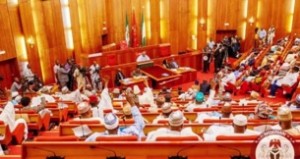
The Nigerian Senate has received the report on the Petroleum Industry Governance Bill from its joint petroleum committee, marking the farthest step in reforming the country’s oil and gas sector through legislation in years.
The report was laid on Thursday by the joint committee which consists of members of the committees on petroleum (downstream and upstream) and gas.
The bill has been in the works for over a decade and been redrafted several times but was never passed by the previous assemblies.
“What a historic day!” said Senate President Bukola Saraki on Thursday. “We are getting there.”
Upon assumption of office in 2015, President Muhammadu Buhari pledged to drive reforms and fight mismanagement, inefficiency and corruption in Nigeria’s petroleum sector, which was in tandem with the 8th Senate’s promise to pass the Petroleum Industry Bill before expiration of its tenure.
When the bill was passed for second reading before moving to the committee stage, the Senate said the proposed legislation “establishes a framework for the creation of commercially oriented and profit driven entities that ensure value addition and internationalization of the country’s petroleum industry.”
“The bill seeks to provide transparency and accountability in the management of Nigeria’s petroleum resources.”
It also seeks to split the Nigerian National Petroleum Corporation into two: national oil company, NOC, and national petroleum assets management commission.
The NOC, as proposed in the bill, will be an “integrated oil and gas company operating as a fully commercial entity and will run like a private company”, while the NPAMC will be a “single petroleum regulatory commission which will focus mainly on regulating the industry.”
Senate President Bukola Saraki had last week promised that the report on the bill would be laid today and that it would be presented for third reading on April 25.
If passed on April 25, the bill will be transmitted to the House of Representatives for concurrence and then to the president for assent before becoming law effectively.
Copyright Ships & Ports Ltd. Permission to use quotations from this article is granted subject to appropriate credit given to www.shipsandports.com.ng as the source.